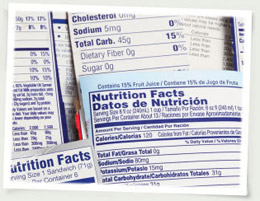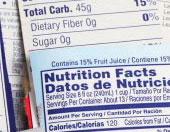Food allergy symptoms and treatments in a nut shell.
Posted in Diet & Nutrition on
July 18, 2010 by NebraskaHealth.com staff.
Last modified on April 21, 2019. Read disclaimer.
Can you identify which of these foods frequently trigger allergic reactions?
- Peanuts
- Tree nuts (including one or more of pecans, pistachios, walnuts, and pine nuts)
- Shellfish (such as shrimp, lobster and crab)
- Eggs
The answer is... all of the above.
+ Free Shipping & Returns on Eligible Items.
(*Amazon's Top 100 list updated hourly.)
In fact, those four join with the following four to comprise the U.S. Food and Drug Administration's "big eight" most allergenic foods:
- Milk (from cows, goats or sheep - though not necessarily baked-in milk products like muffins, cookies, etc.)
- Fish (such as bass, flounder, cod)
- Wheat
- Soybeans
While this short list accounts for 90% of food allergic reactions, more than 160 foods can adversely effect people with food allergies.
What is it about these foods that make them so problematic?
In some individuals, certain food proteins are resistant to digestion. Undigested, these proteins trick the immune system into thinking that our bodies are under attack. This triggers an allergic reaction which can vary from mild to life-threatening.
How do I know if I have a food allergy?
Symptoms of an allergic reaction to food can include:
- Hives
- Flushed skin, rash
- Tingling or itchy sensation in mouth
- Swelling of face, throat, tongue, or lip
- Vomiting, diarrhea
- Abdominal cramps
- Coughing, wheezing
- Dizziness, lightheadedness
- Breathing difficulty
- Loss of consciousness
Severe food allergies can even be life-threatening due to constriction of breathing, lowering blood pressure and leading to shock (anaphylactic shock), and throat swelling and suffocation.
Short of relying on symptoms, the three primary methods for food allergy diagnosis are:
- Skin prick tests
- Blood testing
- Food challenges
All three tests can be performed by an allergist.
What should I do if I think that I may have a food allergy?
By age 6, approximately half of the children with milk, egg, soy and wheat allergies will outgrow them. Some even outgrow peanut and nut allergies. Since there is no cure for food allergies, however, treatment consists of either desensitization therapy or strict avoidance (not only of the offending foods but any other ingredients that contain protein derived from them).
In summary, if you suspect that you many be suffering from food allergies:
- Read product labels and avoid the offending foods.
- Keep an Epi-pen (self-injectable epinephrine) handy for administration during early symptoms of anaphylaxis. Epinephrine, also known as adrenaline, is a common medication used to treat allergic reactions.
- Go to an emergency room if symptoms progress .
 Millions of Americans will have allergic reactions to food this year.
Millions of Americans will have allergic reactions to food this year.
Although most cases will be mild, causing only mild symptoms, some will be severe -- even life-threatening. Education, reading labels and the discipline to avoid offending foods can make all the difference.*
So why are food allergies seemingly more prevalent these days?
Several theories have been proposed:
Hygiene hypothesis: We're just too clean! That's the logic behind this hypothesis. Antibacterial soaps, vaccines, antibiotics and overall improved hygiene means that our immune systems don't have to work as hard as they used to. So, they put too much effort into their second job: fighting off allergens.
Poor diet: Some scientists theorize that our modern diet may play a role in allergies' rise: processed foods, genetically modified ingredients, additives and other unnatural elements derail our gut flora, affecting our immune systems in the process.
Other theories for the increase in allergies include delayed introduction to certain foods (e.g., introducing peanuts at age 2 or 3 instead of earlier), and an increased awareness and reporting of allergies.
Regardless of the cause, there are steps you and your family can take to avoid allergic reactions to food. If you suspect a food sensitivity or allergy, work with your healthcare provider to determine if you have food allergies, and which foods you're allergic to.
For additional food allergy information, visit:
http://www.fda.gov/Food/ResourcesForYou/Consumers/ucm079311.htm
http://en.wikipedia.org/wiki/Food_allergy

 Feeling blah? Boost your mood
Feeling blah? Boost your mood Tips for making fitness fun
Tips for making fitness fun Preparing for retirement
Preparing for retirement Summer heat safety tips
Summer heat safety tips Keeping your teeth in tip-top shape
Keeping your teeth in tip-top shape What are the nutritional needs of children?
What are the nutritional needs of children? Tips for preventing sunburns
Tips for preventing sunburns How to cook dried beans
How to cook dried beans Slow cooking beans in a crock pot
Slow cooking beans in a crock pot Medication safety tips
Medication safety tips Why are food allergies becoming so common?
Why are food allergies becoming so common? Foods associated with romance
Foods associated with romance